-
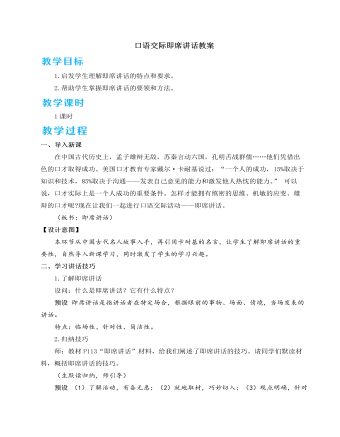
人教部编版语文八年级下册口语交际即席讲话教案
预设 示例:班上分享个人读书经验大家好!既然今天是交流读书体会,那么,我想结合自己的读书体会和大家聊聊读书。一个爱读书的民族,必定是一个文化素质较高的民族;一个爱读书的人,也必定是一个文化素质较高的人。读书能开阔我们的视野,提高我们的写作水平;读书能提升自身修养,丰富我们的人生底蕴。读书是我们精神的呼吸,能让人保持平淡的心境,变得博爱而无私。为了让我们的生活和心灵变得轻盈一些,我们需要读书。那么,应该怎样读书呢?其一,要择书而读。需要的才是最适合的,读适合的书才能有良多收获。如果没有特别需要的书要读,可以读经典。经典是经过岁月沉淀下来的人类智慧的结晶,可以让我们触摸先贤的思想,以充实自身。其二,要读而有术。要对好书反复品味,将其内化吸收,然后进行批判性阅读,有自己的思想主张和拓展探究价值判断;在读书过程中与作者进行辩论,最后形成自己的思想体系,为我所用,而不是让自己的脑袋成为别人思想的“跑马场”。
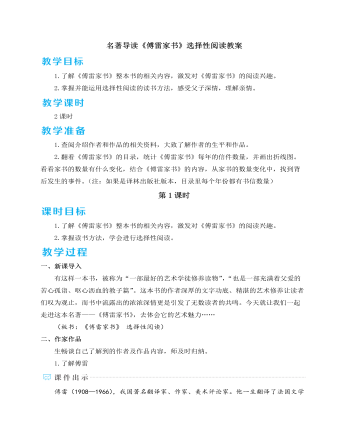
人教部编版语文八年级下册名著导读《傅雷家书》 选择性阅读教案
评价:这段话表明傅雷朋友的角色。他把孩子当成朋友,为人生得一知己而感到兴奋、自豪。在读这段话时声音应洪亮,感情应充沛。小结:我们组还发现傅雷对傅聪的称呼有很多,如聪、聪儿、孩子、亲爱的聪、亲爱的孩子。有时两个同时用,比如“聪,亲爱的孩子!”一直以来,我们都觉得父爱不善表达,可是傅雷的这些亲昵直白的称呼表达了他对傅聪的爱,是这么的温柔,如慈母一般。所以,读这些称呼时我们要读得轻柔深情些。【设计意图】这一环节不仅能展示学生的阅读成果,还能使学生感受到阅读的成就感,并在相互交流中产生更深刻的理解和感悟,在朗读和评价中体会父爱。二、感悟成长1.解读“虎爸”师:在同学们的阅读分享中,傅雷这样一个深爱儿子的父亲形象深入人心。其实,傅雷早期对傅聪的教育是很严苛的,是一个“虎爸”的形象。我们一起来看一则小故事。
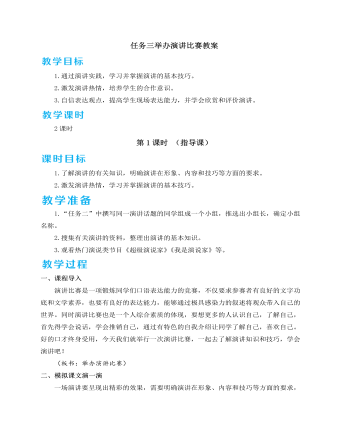
人教部编版语文八年级下册任务三举办演讲比赛教案
本环节通过评委宣布比赛规则和评分细则,为下面比赛活动中,学生学会欣赏和评价演讲打下基础。三、八仙过海赛一赛(主持人组织演讲比赛)演讲比赛的程序:1.各组参赛同学抽签,确定演讲顺序。2.参加比赛的同学按照顺序进行演讲,每位选手演讲完毕,评委现场打分。3.评委根据评分细则评分,去掉最高分和最低分,记分员核算出选手的平均分,并由主持人公布最后得分。4.每位参赛者演讲结束,评委和教师进行简要点评。5.第二轮由每组得分最高的选手进行即兴演讲拉票,决出班级前三名。6.主持人宣布比赛结果。7.活动结束。【设计意图】本环节通过演讲比赛和评价两个活动的交互进行,让学生进一步理解演讲技巧的具体运用方法,从而提高演讲能力。在整个演讲活动中,学生组织活动和实施活动的能力可以得到充分地展现和发挥。四、尺短寸长评一评1.精彩的演讲结束了,在这次演讲比赛中,给你留下深刻印象的演讲有哪些?请说明理由。(生自由发言,对演讲活动进行总结评价)2.在这次精彩的演讲比赛中,大家有哪些收获?请结合活动过程具体来谈。
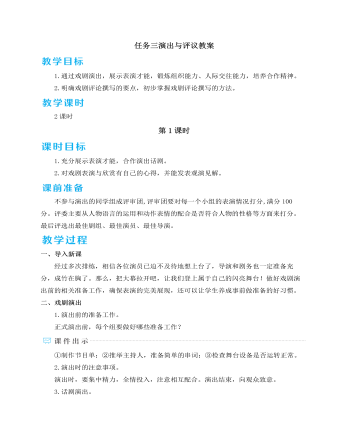
人教部编版语文九年级下册任务三演出与评议教案
从以下话题中任选其一(也可自选话题),写一篇作文,谈谈自己对剧本和戏剧表演的认识。不少于600字。①我为什么对“他”印象最深②舞台说明不只是“说明”③戏剧冲突面面观④台词应该怎样说⑤肢体语言很重要⑥配角也要演到位⑦“好戏”是配合出来的2.技法点拨。①写作时,结合对剧本和戏剧表演的认识,发表自己的见解和看法,力求明白晓畅,切勿写得深奥晦涩难懂。②阐述认识时,要列举剧本和戏剧表演的实例进行分析,便于读者理解和信服。③涉及把握不准的专业术语需查阅相关资料、典籍,规避错误,以免误导读者。④明确提出观点,筛选典型事例作为依据,分析材料与观点之间的关系。师:无论是选择哪一个话题,都要结合具体的实例进行分析,不能只列条目而无内容。针对某一戏剧或谈人物,或谈舞台说明,或谈矛盾冲突,或谈肢体语言,或谈相互配合等;也可以针对某个话题,列举多部戏剧中具体的一句、一段话,或一幕。

人教版新目标初中英语七年级下册Don’t eat in class教案2篇
Don’t fight. =You can’t fight. (板书,教读)教师把这些句子板书在黑板上,并请学生大声整齐地读祈使句和“can’t”句型,并让学生注意两种句型表达形式的不同和转换,“Don’t …=You can’t…”;并对学生说:These are our school rules. (板书,教读) You can’t break the school rules. Don’t break the school rules.(板书,教读)步骤3 :Practicea. T: Now, each of the students is breaking one of these rules.Please finish 1a.学生看图,完成1a的内容,检查答案并大声朗读校规。b. 听录音,完成1b,选出四位学生都违反了哪条校规;听之前,学生要读会英文名。c. 请两位学生朗读1c部分的句型;要求学生两人一组对话表演,SA扮演外校转来新生,SB告知本校校规。(学生可经过讨论,多说出他们想到的校规,不必只限于书上;教师应给予帮助)2) 第二课时(2a~4)步骤1 :warming up of revisionT: What are the rules at your school?学生使用“can”或祈使句表达各条校规;其中老师可引出“eat in the cafeteria outside”的表达。步骤2 :Practicea.T: Christina is an exchange student. She doesn’t know the rules. Let’s listen, what activities they’re talking about?学生听第一遍时,完成2a;第二遍时,完成2b;b. 请学生领读2c部分,看着2a完成的表格,理解2c活动的要求;分成小组针对2a进行问答;

人教版新目标初中英语七年级下册I want to be an actor教案2篇
三、教学建议第一课时:1. Lead in (Vocabulary)A) Before class, teacher should collect some pictures of working places. For example: Bank, TV Station, Restaurant, Police Station, Hospital ...B) In class, show students the pictures (PowerPoint, OHP). Ask students to tell the name of the working places and the name of the jobs.Shop assistant, doctor, actor, reporter, police office, waiter, bank clerk, studentC) Do exercise 1a and 3a.2. Bingo GameAsk groups of students to make up pairs of cards with a job on one and the related workplace on the other. For example, waiter / restaurant, teacher / school, doctor / hospital. Encourage students to use both the job / workplace combinations in the book and the ones that students came up during class discussions. Be sure they have twice as many sets of cards as there are students in the group. They can make two sets of cards for a single job / workplace, if necessary. Then have each group mix up its set of cards and hand their cards out in random order. Each time a student gets a pair of cards that match, he or she can lay these cards down. The goal is to have no cards in your hand at the end.3. Task OneA) Ask students to work in pairs and ask the partner what does he / she want to be in the future.e. g. :What do you / does he / does she want to be?I want to be a.Why?Because it's (adj).B) Vocabulary: Section B, 1a4. Homework 1.2.
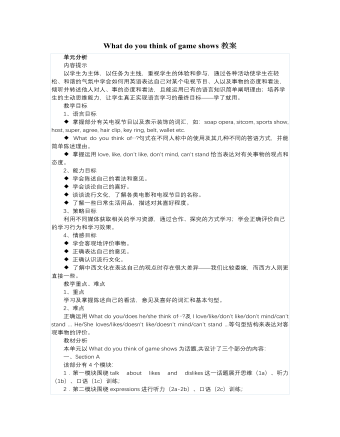
人教版新目标初中英语七年级下册What do you think of game shows教案
五、教学Section B-2c1. Pair work: What do you think of the belt/sunglasses/…? What does your father/mother/… think of your scarf/belt…?2. Group work(1). Teacher shows some different kinds of school uniforms (制服)and asks : “ What do you think of your school uniforms? If you have a chance to choose your school uniforms, what kind would you like to choose?”(2). Discuss in groups.(3).Get some Ss to report in class.说明:这一步旨在让学生运用已有的语言知识谈论对事物的看法和意见,并简单阐明理由,培养学生的主动思维能力和运用英语的能力。六、教学拓展调查电视节目的收视率任务:调查你周围的人对现在各种电视节目的反响。活动过程:1.教师布置任务,让学生调查周围的人(包括他的亲戚朋友和邻居)喜欢收看哪方面的电视节目。2.学生进行调查活动,运用本单元所学的句型What do you think of….? (Why?)What's your favorite game shows?What do you think of talk show?I doesn’t mind it.I like it.I love it.I can’t stand it.3.记录下排在前10位的TV Program,填写调查表,比较其收视率。
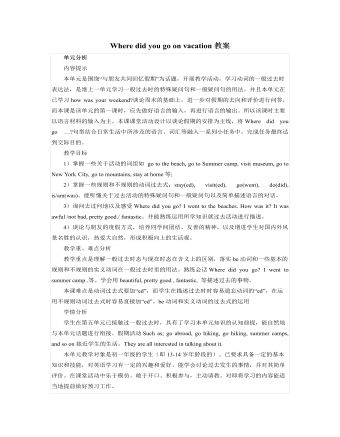
人教版新目标初中英语七年级下册Where did you go on vacation教案
句型: Where did you go on vacation? I went to summer camp.Did she go to Central Park?Yes,she did.No, she didn’t语法:一般过去时特殊疑问句、一般疑问句及肯、否定回答。课时安排4课时第一课时:Section A:la,1b,lc,2a,2b,2c 第二课时:Section A:3a,3b,4第三课时:Section B:1,2a,2b,2c第四课时:Section B:3a,3b,3c,4 and Self Check第一课时教学目标掌握描写假期生活的形容词。假期里自己所做事情的简单表达。谈论假期做的事情及当时情况。谈论假期时旅游的天气,旅游者以及食物等。教学过程一、导入播放一首英文歌曲:Let’s travel 说明:通过让学生听节奏欢快迪斯尼英语歌曲Let’s travel.引入本节课谈论的话题vacation and travel. 让歌曲使学生的思维活跃,增强课堂气氛,激发学生提高学习英语的兴趣。T:How is the trip ?Ss : It’s pretty good/ happy/exciting /relaxing/busy/dangerous/ fantastic说明:这个问题是为了操练形容词。建议让多个Ss作答。鼓励他们用不同的形容词。上述个别形容词本应在第二课时中出现,但可以在warming-up中第一次非正式出现。这些形容词也可在老师的评价语中适时出现,以加深学生对词汇的印象。

人教版新目标初中英语八年级下册It’s a nice day, isn’t it教案2篇
"Hello! Welcome to English class! Introduce yourself. Meet your new classmates." That's what the teacher says. What do you say? "Oh no!" It can be difficult talking to new people. But it can be fun, and you can make friends. How do you do it? Make small talk. Small talk is polite conversation. "Wang Nan is a great pingpang player, isn't she?" "I'd love to meet her, wouldn't you?" "It's been raining a lot, hasn't it?" Tag questions are a form of polite speech. To make small talk successfully, you should know how to make them. You should also know what topics to talk about. Try to learn this unit carefully. The next time you're in English class, you'll find out. Making small talk's easy, isn't it? (“你好!欢迎你!请做一下自我介绍。认识一下你的新同学。”通常在课上老师会这样说。你会说什么呢?“噢,不!”与陌生人谈话太困难了。但是这也很有意思,并且你还能交到朋友。你该怎么做呢?闲聊。闲聊指得是礼貌的对话。“王楠是一个很棒的乒乓球运动员,不是吗?”“我希望自己能认识她,你呢?“今年的雨水很多,不是吗?”反意疑问句是一种礼貌用语。为了使得谈话成功,你应该知道怎样去进行闲聊。你还应该知道与不同的人该谈论什么样的话题。认真的学习这个单元吧,下次在英语课上,你会发现与大家展开谈话是一件很容易的事情,不信我们来试试。)
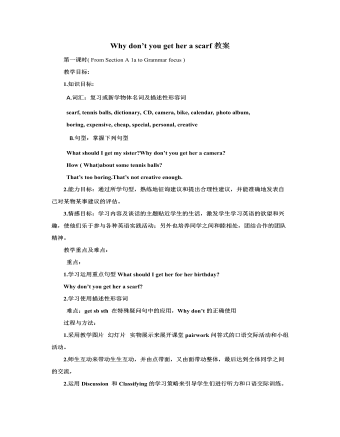
人教版新目标初中英语八年级下册Why don’t you get her a scarf教案
教师带领学生复习有关描述宠物的词汇,采用教师提问学生回答的方进行。如:T:What animals do you think would be good pets?What animals do you think would be bad pets?What do you think are good animals for a six-year-old child?然后学生进行 pairwork 练习。Task two: 师生互动,学习探究 1、播放3a部分的录音,引导学生一边听录音,一边跟读。2、通过听录音学生回答以下问题:Why do you think pot-bellied pigs are popular?What are the advantages and disadvantages of keeping such a pet?教师对学生的回答进行及时点评。3.学习范文,学习重点短语,为下步的模仿写作提供语言素材。T :1. )Have you ever kept a pig as a pet?Do you like pigs? St.:No.…Why don’t you like to keep a pig? St: No.They’re too dirty and lazy(Do you know in some foreign countries like Hollyland, Australia,pigs are the most popular pet.there’s a kind of pig.(图)it has an interesting name? it ‘s called a pot-bellied pig.) Now,let’s learn an article about this kind of interesting pet.2.)play the tapeSt.:Listen and repeat3.)show some Qs on computer(本子St.: read silently,then answerthe Qs(本子)4.)Ask ss. Close book and retell this passage.(what is a pot-bellied pig? Is it a good or bad pet? ) St.: retell it to each other“A pot –bellied pig is a popular pet now…”5.read the article together.St.:.practice reading

人教版新目标初中英语九年级下册By the time I got outside, the bus had already left教案
Ⅰ. Teaching Aims and Demands1. Knowledge Objects(1) Key Vocabularyoversleep(2) Target LanguageWhat happened?I overslept. And by the time I got up, my brother had already gotten in the shower.2. Ability Objects(1) Teach the students to use the new words.(2) Train the students to narrate past events with the Past Perfect Tense.(3) Train the students' listening and speaking skills with the target language.3. Moral ObjectIt’s a good habit to go to bed early in the evening and get up early in the morning. So you’ll never be in a hurry in the morning.Ⅱ. Teaching Key Points1. Key Vocabularyoversleep2. Target LanguageNarrate past events with the Past Perfect TenseⅢ. Teaching Difficult Points1. Train the students to narrate past events with the Past Perfect Tense.2. Train the students to understand the target language in spoken conversation.Ⅳ. Teaching Methods1. Thinking of examples from the students' real lives.2. Making sentences by looking at the pictures.Ⅴ. Teaching AidA tape recorderⅥ. Teaching ProceduresStep I Revision1. Revise the language points in Unit 8.Ask some questions like this: What volunteer work would you like to do?Help the students to answer, I’d like to…/I love to…/I hope to2. Practice the dialogue in Activity 3c on page 62 again. Get students to role play the similar dialogues with the following.

人教版新目标初中英语九年级下册Could you please tell me where the restrooms are教案
Step Ⅰ RevisionCheck homework. Ask a few students to read the article in 3a.Then ask a few students to read their guides.Step Ⅱ Part 1Look at the words in the box. Ask a student to read them. Make sure the students understand the meaning of the words. You are to fill in the blanks with the words. In some cases, students may need to use another form of the word, for example adjusting for tense or subject/ verb agreement.Ask students to fill in the blanks on their own.Check the answers. Step ⅢPart 2Go through the instructions with the class.Look at the example with the students.Ask students what the answer would be.Ask a student to read the question and answer it.Excuse me, could you tell me where the bank is, please?The bank is across the street from the shopping malt.Get students to complete the work in pairs.Check the answers. Ask a few students to read their questions.Step Ⅳ Just for Fun!Ask all the students to read the conversation. Ask: What is funny about this cartoon? Help students to explain. A Martian is a person from the planet Mars.There is no such thing as Martian food on Earth, and the clerk looks silly because he is trying to think of where there is a Martian restaurant.Invite some pairs of students to present this conversation to the rest of the class.Step Ⅴ Summary and HomeworkIn this class, we’ve done much writing practice using the key vocabulary words and the target language presented in this unit. After class, please finish the questions in 2 in your exercise books. Then finish the exercises on pages 47~48 of the workbook as well.The Seventh Period Ⅰ Teaching Aims and Demands1. Knowledge Objects(1) Key Vocabularyimage, adventure, jealousy, hero, crime, journey, brave, no longer, show interest in, take it easy, become interested in, plain looks(2)Text:Grown-ups like cartoons, too.2. Ability Objects(1) Fast-reading to get a general idea of the text.(2) Careful-reading to get the detailed information in the text.

人教版新目标初中英语九年级下册I’ll help clean up the city parks教案
Talk about offering help (P60)I’ll help clean up the city parks.A: I’d like to work ...B: You could help ...Talk about ways to tell people about the Clean-Up Day (P61)We need to ...We can’t ...I’ll ...Talk about the work the volunteers do (P62)These three students all volunteer their time to help other people.Somebody loves to ... / helps ... / plans to ... / wants to ...A: What do you like doing?B: I like ... A: What kind of volunteer work do you think I could do?B: You could ...1. 重点词汇advertisement, fix, repair, pleasure, blind, deaf, shut, carry, specially, fetch2. 认读词汇hunger, homeless, cheer, clean-up, sign, establish, major, commitment, elementary, veterinarian, coach, similar, call-in, strategy, disabled, organization, unable, support, appreciate, donation, part of speech, pronoun, adverb, preposition, conjunction, donate, Jimmy, Sally3. 词组clean up, cheer up, give out, put off, set up, think up, take after, fix up, give away, put up, hand out, work out, at once
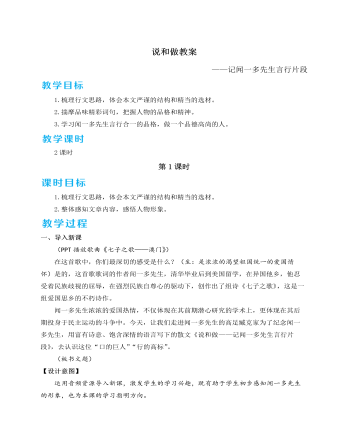
人教部编版七年级下册说和做——记闻一多先生言行片段教案
【设计意图】这个环节的设计是在学生掌握了学法的基础上,放手让学生自主学习,从而真正做到“将课堂还给学生”。这样的设计不仅充分激发了学生的学习兴趣,而且更能促使学生真正掌握初步分析人物形象的方法。四、联系实际,拓展延伸1.作者臧克家笔下的闻一多先生是一位潜心于学术研究,“做了再说,做了不说”的学者;也是一位英勇无畏,“说了就做,言论与行动完全一致”的革命家。中国自古以来就重视言行一致,并把它当成做人的准则之一。请收集关于言和行的成语或名言,选取一句作为你的座右铭,并说明理由。2.课外阅读闻一多的《太阳吟》《死水》《静夜》等诗作,欣赏其艺术特色,感受其中的精神追求。
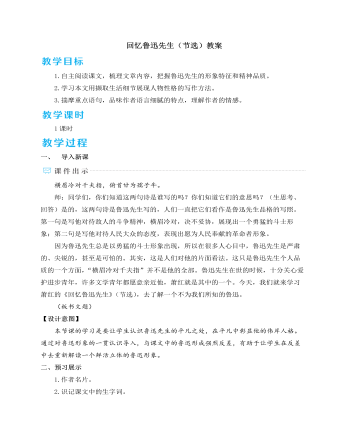
人教部编版七年级下册回忆鲁迅先生(节选)教案
《回忆鲁迅先生》(节选)是一篇典型的有较长篇幅的散文。本教学设计以点带面,长文短教,设计了这样一个问题:“作者在文中为鲁迅先生塑造了多个身份,具体有哪些?”如此化繁为简,使课堂教学脉络清晰。学生在阅读长篇幅文章时有了抓手,就可以有条理地去思考,形成系统性思维,直达教学目标。本教学设计还要求学生进行批注式阅读,直入文本。学生围绕“说说鲁迅先生身上有哪些优秀的品质让学生萧红印象深刻?”做赏析式或者评价式批注,让学生在自读这篇文章时,将无目的阅读变为有效阅读,既提高了课堂效率,也让学生真正做到潜入文字之中,通过关注文章细节来深入把握文本。本教学设计整体上以学生自主学习为主,教师适当引导。遵从“整体感知内容—局部探究—体会情感”的一般阅读规律,以读为指引,让学生在读中感知内容,在读中把握人物形象,在读中体悟情感。各环节之间环环相扣,由浅入深,层层推进。
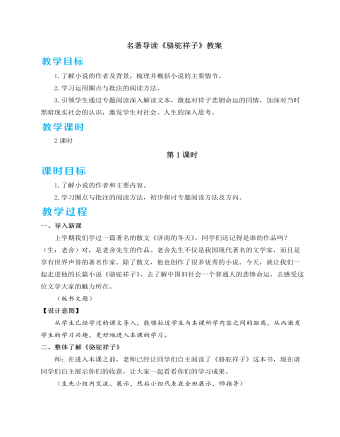
人教部编版七年级下册名著导读 《骆驼祥子》 圈点与批注教案
本环节交流的内容侧重于体验与心得,是建立在充分阅读后的再创作,也是对小说阅读方法和内容的总结性归纳和展示,需要学生有较高的阅读理解能力。三、延伸探讨《骆驼祥子》的艺术特色师:同学们,了解经典作品的艺术魅力,然后能运用到自己的写作中,是何等快乐的事啊!请你根据自己的阅读体验,概括对《骆驼祥子》这部小说艺术特色的评价。(生小组内交流、讨论,然后推荐代表在全班交流,师明确)预设 (1)结构紧密,线索分明。(2)语言朴实自然,生动明快,具有鲜明的地方色彩和浓厚的生活气息。幽默和“京味儿”语言运用熟练。(3)善于运用各种描写方法(肖像、心理、环境描写等)来表现人物的思想性格及发展变化。(4)有深厚的文化底蕴。写北京的生活,北京的车夫,北京种种的风俗人情等。在炎凉的世态中揭示地方文化。
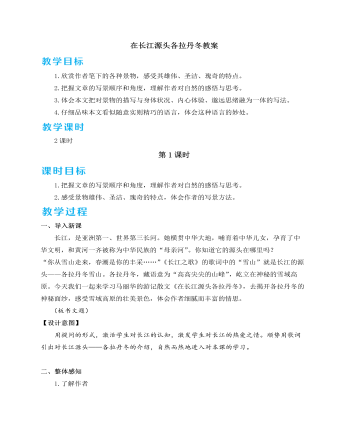
人教部编版语文八年级下册《在长江源头各拉丹动》教案
预设 第一组:(1)语言精准又生动形象,首先用长句总写各拉丹冬的变化多端,然后接连用短句,简笔勾勒各拉丹冬巍峨高大、棱角分明的特点,张弛有度,富有音乐美感。(2)用语精简而准确,形象性强,短促的句子节奏,很好地表现出冰体形状之多令人目不暇接,最后部分节奏放缓,形成一种张弛有度的音乐美,让句子又融入段落主体比较舒缓的节奏中去。第二组:(1)将自己的身体不适比喻为“小震”“大地震”,描写自己由于病痛而行动迟缓的“犹如霹雳舞的‘太空步’”,幽默之中,透露出作者乐观、坚强的精神和对探险事业的热爱。 (2)用“分外利落”形容自己拍摄冰山时跌倒骨裂的情景,好似没有痛苦一般。这幽默调侃之中,透露出作者乐观、坚强的精神。第三组:(1)“眩晕”原指一种症状,感觉到自己或周围的东西旋转,这里指“浩浩苍苍”的美景令人目不暇接,令人不知该看什么;“卖弄”原指有意显示、炫耀,含贬义,这里指大自然的无穷创造力在各拉丹冬展现得淋漓尽致。
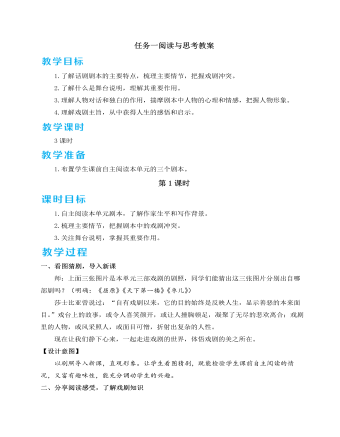
人教部编版语文九年级下册任务一阅读与思考教案
结束语:通过这节课的探究,我们了解了本单元三部戏剧的背景和主旨,相信大家对剧本的理解更深了。下节课,我们就要准备排练戏剧,希望大家课下再好好读读剧本,加深理解。五、布置作业1.课后查阅关于表演的相关资料,了解表演的知识。2.选择最喜欢的一个剧本熟读,并选择其中最喜欢的一个人物,揣摩应如何表演。剧本学习是一项新的教学内容,本次教学设计主要以人物为核心,从三个方面展开:(1)从文本的角度读剧本。从基本的情节入手,通过理解情节中的矛盾冲突来感知人物形象,让学生建立对剧本的基本理解。(2)从表演的角度读剧本。训练学生的朗读能力,引导学生通过台词来理解人物,为下阶段的舞台表演打下基础。(3)从现实的角度读剧本。指导学生认识剧本的现实意义,促进学生的成长。

人教版新目标初中英语七年级下册How was your weekend教案2篇
Teaching Goal:1. General aims:Talk about recent past events2. Particular aims:A. Language Focus.Talk about recent past events and think of the past events.B. Language goalsHow was….?It was …What did …do over the weekend?C. Language structures:(1). How was your weekend? I was great. Pay attention to no form.(2). What did you do over the weekend? I played soccer. We went to the beach.D. Useful words and phrases:Words: was, did, went, beach, over, project, test, wasn’t, false, number, geography, spend, week, most, mixture, their, had, little, cook, read, saw, change, everyone, sit, sat, no, anythingPhrases: did one’s homework, played soccer, cleaned my room, went to the beach, played tennis, went to the movies, on Saturday morning, over the weekend, cook … for, what about, do some reading, have a party, talk show, go shoppingE. Grammar language:Present simple past tenseRegular and irregular verbsF. Learning strategies:Tour and holidaysG. Interdiscipinary:H. Emotion and manner:Teaching time: 5 periodsTeaching procedures:Period One教学步骤、时间 教师活动 学生活动 媒体应用Step 1Free talk 3’ Ask some questions like:Who’s on duty today?What’s the weather like? Answer and talk about something.让同学们回答下列问题1. Do you like weekend? (Let some students answer)It takes them three minutes to talk about the question.2. Why do you like weekend? (let the students answer) Most of the students like the weekend此时教师用汉语问:“在周末期间问你干了什么?这句话用英语这么回答?Let the students guess.At last the teacher give them right answer3. What did you do over the weekend?(板书、学习)
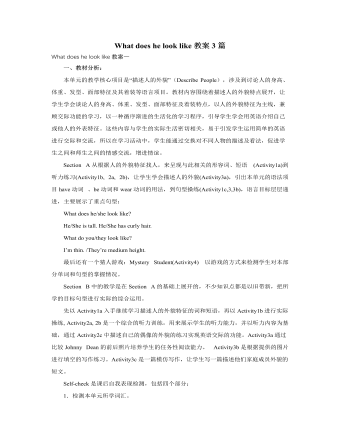
人教版新目标初中英语七年级下册What does he look like教案3篇
所需要用到的句子:Who is that?That is Jack. I like him.Why do you like him?I like him because he is interesting.Task 4: 设计理想中的人类Step one: 设计理想中的人类的外貌。把全班同学分成若干小组,学生可以边说边在纸上画出他们的模样。Step two: 设计理想中人类的性格。学生们可以把那些能描述性格的单词写在图画的旁边。Step three: 每组选出一名同学,其他同组同学提问,他作简单回答,并说明原因。所需用到的句子:What does he or she look like?He or she ...What is he or she like?He or she is ...Why?Because ...Task 5: 挑战性活动调查性格是天生的还是后天形成的,让每个同学回家去调查一下自己成长过程中性格是否有变化,具体是怎样的,为什么会这样? Teaching Aims:1. Enable students to have a general understanding of how to talk about people's physical appearance.2. Enable students to tackle some essential vocabularies and patterns about describing people. Provide them with necessary skills and methods.3. Create various chances for students to describe the persons they're familiar with, such as classmates, family members, teachers, idols, etc.










